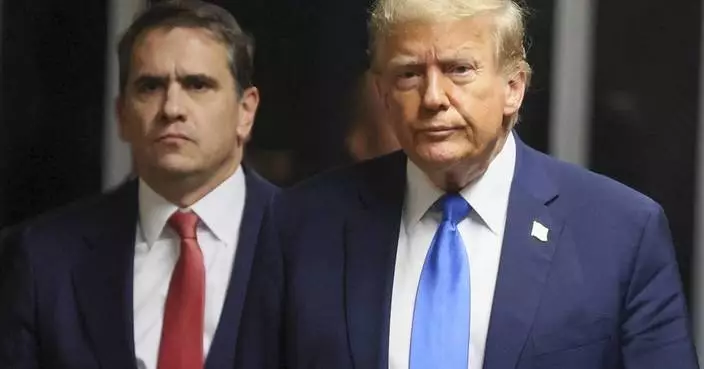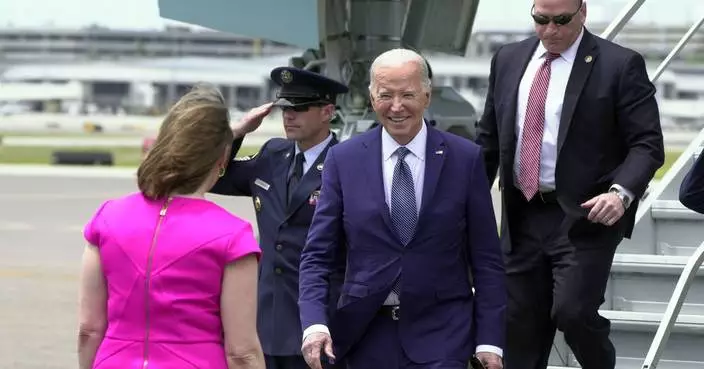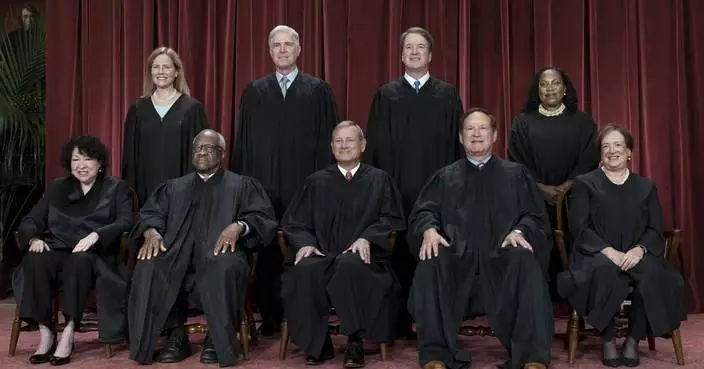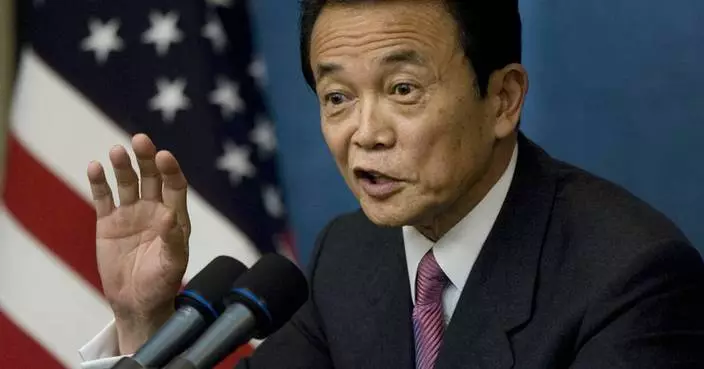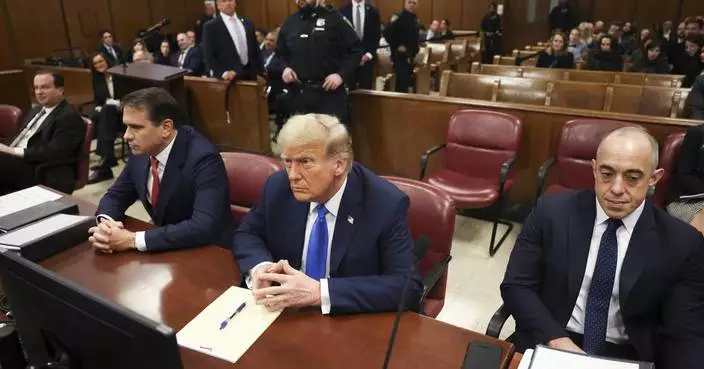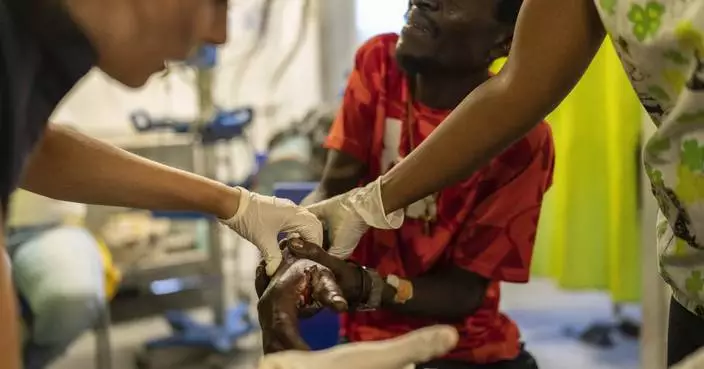Primed for economic combat, President Donald Trump set in motion tariffs on as much as $60 billion in Chinese imports to the U.S. on Thursday and accused the Chinese of high-tech thievery, picking a fight that could push the global heavyweights into a trade war.
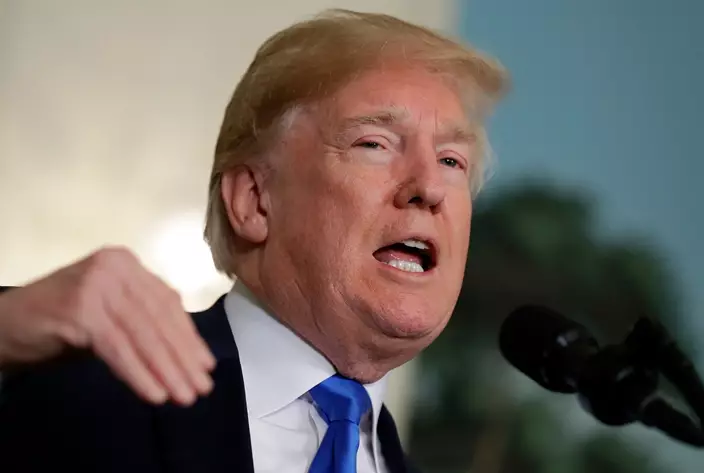
President Donald Trump speaks before he signs a presidential memorandum imposing tariffs and investment restrictions on China in the Diplomatic Reception Room of the White House, Thursday, March 22, 2018, in Washington. (AP Photo/Evan Vucci)
China threatened retaliation, and Wall Street cringed, recording one of the biggest drops of Trump's presidency. But he declared the U.S. would emerge "much stronger, much richer."
It was the boldest example to date of Trump's "America first" agenda, the culmination of his longstanding view that weak U.S. trade policies and enforcement have hollowed out the nation's workforce and ballooned the federal deficit. Two weeks ago, with fanfare, he announced major penalty tariffs on steel and aluminum imports that he said threatened national security.
However, even as Trump was talking tough at the White House, his administration moved to soften the sting of the metal tariffs, telling Congress on Thursday that the European Union, Australia, South Korea and other nations would join Canada and Mexico in gaining an initial exemption. And that raised questions about whether his actions will match his rhetoric.
China responded early Friday by announcing a list of U.S. goods, including pork, apples and steel pipe, it said may be hit with higher import duties.
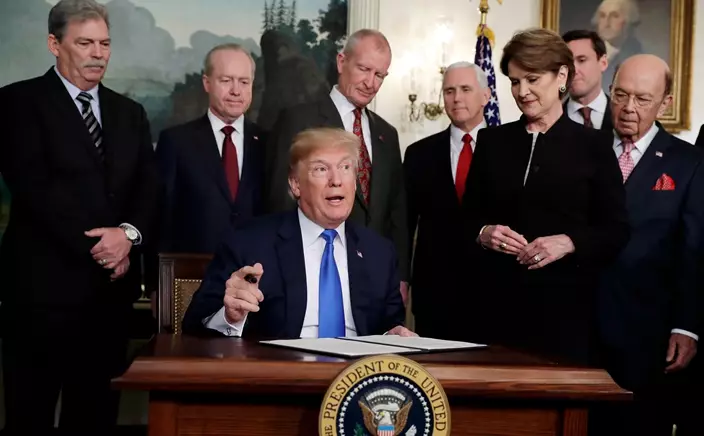
President Donald Trump signs a presidential memorandum imposing tariffs and investment restrictions on China in the Diplomatic Reception Room of the White House, Thursday, March 22, 2018, in Washington. (AP Photo/Evan Vucci)
The Commerce Ministry said the higher U.S. tariffs "seriously undermine" the global trading system. The ministry urged the U.S. "to resolve the concerns of the Chinese side as soon as possible," and appealed for dialogue "to avoid damage to overall Chinese-U.S. cooperation."
At home, investors on Wall Street showed their rising concern about retaliation and business-stifling cost increases for companies and consumers. The Dow Jones industrials plunged 724 points.
Trump himself, joined by supportive business executives, complained bitterly about the nation's trade deficit and accused China of stealing America's prized technology.
"Any way you look at it, it is the largest deficit of any country in the history of our world. It's out of control," Trump said of the U.S-China imbalance. The U.S. reported a $375 billion deficit with China last year, which Trump has blamed for the loss of American jobs and closing of plants.
The president said the tariffs could cover "about $60 billion" in trade with China, but senior White House officials said the U.S. Trade Representative had identified 1,300 product lines worth about $50 billion as potential targets.
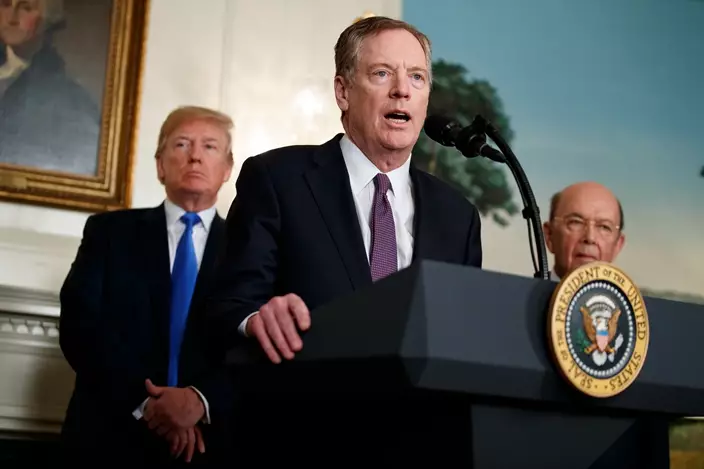
President Donald Trump, left, and Secretary of Commerce Wilbur Ross, right, listen to United States Trade Representative Robert Lighthizer speak during an event to announce tariffs and investment restrictions on China, in the Diplomatic Reception Room of the White House, Thursday, March 22, 2018, in Washington. (AP Photo/Evan Vucci)
That list will include aerospace, information and communication technology, and machinery, according to a USTR fact sheet. But further details were scant.
The order signed by Trump directed the trade representative to publish a list of proposed tariffs for public comment within 15 days. Trump also asked Treasury Secretary Steven Mnuchin to come up with a list of restrictions on Chinese investment and said the administration was preparing a case before the World Trade Organization.
Despite Trump's confident words, business groups and Republican lawmakers are worried his tariffs could undercut actions they have welcomed in his first year.
"The vast majority of our members are very concerned that these trade actions will at a minimum undermine the strong business confidence that has been created by the tax and regulatory process," said Josh Bolten, president and CEO of the Business Roundtable. "And if it's taken to an extreme, it will reverse that progress."
Dozens of industry groups sent a letter last weekend to Trump warning that "the imposition of sweeping tariffs would trigger a chain reaction of negative consequences for the U.S. economy, provoking retaliation, stifling U.S. agriculture, goods, and services exports, and raising costs for businesses and consumers."
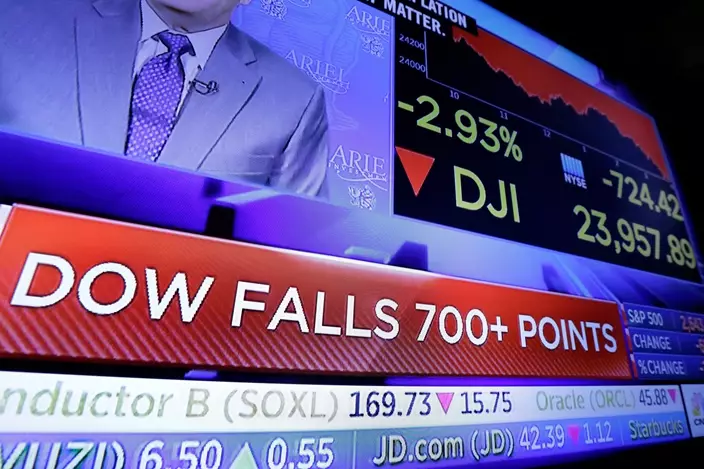
A television screen on the trading floor of the New York Stock Exchange shows the closing number for the Dow Jones industrial average, Thursday, March 22, 2018. (AP Photo/Richard Drew)
Kansas Sen. Pat Roberts, Republican chairman of the Senate Agriculture Committee, suggested lawmakers may need to consider what he called a "Trump Tariff Payment" to compensate farmers if their crops face retaliation.
But some labor unions and Democrats said Trump was justified in delivering a swift blow to China after years of a lax response from the U.S.
"Chinese cheating has cost American jobs and I applaud the administration for standing firm in its commitment to crack down on China's continued violations," said Sen. Sherrod Brown of Ohio.
Thursday's announcement marked the end of a seven-month investigation into the hardball tactics China has used to challenge U.S. supremacy in technology, including, the U.S. says, dispatching hackers to steal commercial secrets and demanding that U.S. companies hand over trade secrets in exchange for access to the Chinese market.
Business groups mostly agree that something needs to be done about China's aggressive push in technology, but they worry that China will retaliate by targeting U.S. exports of aircraft, soybeans and other products and start a tit-for-tat trade war of escalating sanctions between the world's two biggest economies.
"China has been trying to cool things down for weeks. They have offered concessions," said Mary Lovely, a Syracuse University economist and senior fellow at the Peterson Institute for International Economics. "I fear they will take a hard line now that their efforts have been rebuffed. ... China cannot appear subservient to the U.S."
The move against China comes just as the United States prepares to impose tariffs of 25 percent on imported steel and 10 percent on aluminum — sanctions that are meant to hit China for flooding the world with cheap steel and aluminum.
Trump campaigned on promises to bring down America's massive trade deficit — $566 billion last year — by rewriting trade agreements and cracking down on what he called abusive practices by U.S. trading partners. The president said Thursday, "It's probably one of the reasons I was elected, maybe one of the main reasons."
But he has been slow to turn rhetoric to action. In January, he did impose tariffs on imported solar panels and washing machines. Then he unveiled the steel and aluminum tariffs, saying reliance on imported metals jeopardizes U.S. national security.
To target China, Trump dusted off a Cold War weapon for trade disputes: Section 301 of the U.S. Trade Act of 1974, which lets the president unilaterally impose tariffs. It was meant for a world in which large swaths of global commerce were not covered by trade agreements. With the arrival in 1995 of the World Trade Organization, Section 301 fell largely into disuse.
Trump and Chinese President Xi Jinping enjoyed an amiable summit nearly a year ago at Trump's Mar-a-Lago resort in Florida. But America's longstanding complaints continued to simmer.
Chinese Premier Li Keqiang this week urged Washington to act "rationally" and promised to open China up to more foreign products and investment.
NEW YORK (AP) — Former National Enquirer publisher David Pecker testified Tuesday that he offered to be the “eyes and ears” of Donald Trump's 2016 presidential campaign, a pledge that led to an agreement to give Trump's personal lawyer advance notice of allegations and negative stories that might hamper the political aspirations of the then-candidate.
Pecker elaborated on that agreement, testifying that the tabloid ran negative stories about Trump's political opponents and even paid for a doorman's silence after the man came forward with allegations that Trump had fathered a child.
Testimony in the case resumed just before midday following a morning hearing on the former president’s alleged gag order violations.
Like on Monday, Pecker was the only witness to take the stand in the historic hush money case.
Prosecutors have said the former tabloid publisher worked with Trump and Michael Cohen on a “catch-and-kill” strategy to buy up and then spike negative stories. Among the allegations is a $130,000 payment that Cohen made to porn actor Stormy Daniels to bury her claim of an extramarital sexual encounter with Trump in 2006. Trump has denied that the encounter ever took place.
Prosecutors and defense attorneys in opening statements Monday painted competing portraits of the former president — one depicting him as someone who sought to corrupt the 2016 presidential election for his own benefit and another describing him as an innocent, everyday man who was being subjected to a case the government “should never have brought.”
Prosecutors say Trump obscured the true nature of those payments in internal business documents.
He has pleaded not guilty to 34 felony counts of falsifying business records.
The case is the first criminal trial of a former American president and the first of four prosecutions of Trump to reach a jury.
Currently:
— Key takeaways from the opening statements in Donald Trump’s hush money trial
— Key players: Who’s who at Donald Trump’s hush money criminal trial
— The hush money case is just one of Trump's legal cases. See the others here
— Trump could avoid trial this year on 2020 election charges. Is the hush money case a worthy proxy?
— What to know in the Supreme Court case about immunity for former President Trump
Here's the latest:
The jury in Donald Trump's hush money trial has been sent home for the day, with court adjourning early for the Passover holiday.
Jurors had to directly pass by Trump at the defense table as they exited just after 2 p.m. but none appeared to look in his direction.
Afterward, Trump peered at reporters in the courtroom gallery as he ambled to the hallway. He clutched the same pile of clipped papers he walked in with earlier.
Trial proceedings will resume on Thursday.
An internal National Enquirer email and invoice were entered into evidence in Donald Trump's hush money trial Tuesday afternoon.
The documents were shown to jurors and describe payments made to Dino Sajudin, then a Trump Tower doorman, to kill his story about a child Trump had allegedly fathered with an employee.
One of the documents describes the funds coming from the publication’s “corporate” account. An invoice prepared by an executive editor references an “immediate” $30,000 bank transfer payment for “‘Trump’ non-published story.”
The tabloid ultimately concluded the story was not true, and the woman and Trump have both denied the allegations.
David Pecker testified Tuesday that he'd never paid to bury a story about Donald Trump before Dino Sajudin, then a doorman at Trump Tower, came along.
The former National Enquirer publisher recalled calling Michael Cohen and explaining that they could purchase the doorman’s silence for $30,000 by buying the exclusive rights to his story.
“He said, ‘Who’s going to pay for it?’ I said, ‘I’ll pay for it,’” Pecker testified. “Then he said, ‘Thank you very much.’ He said, ‘The boss will be very pleased.’”
In response to the prosecutor’s question about who he understood “the boss” to be, Pecker replied: “Donald Trump.”
Explaining why he decided to have the National Enquirer foot the bill, Pecker testified: “This was going to be a very big story."
He added that it would “probably be the biggest sale of the National Enquirer since the death of Elvis Presley,” but noted he would’ve held it until after the election, citing his agreement with Cohen.
Pecker described the National Enquirer’s “normal” procedure of placing Sajudin under a polygraph test to determine if his tip was legitimate, but prosecutor Joshua Steinglass stopped him before he could reveal the results, which isn’t allowed in court.
Pecker said the National Enquirer hired a private investigator, sent reporters to a location where the supposed child was living and used other verification methods — ultimately learning that the story was “1,000% untrue.”
“Had you ever paid a story to kill a story about Donald Trump?” Steinglass asked.
“No I had not,” Pecker said.
Following questions about his relationship with Donald Trump, the former publisher of the National Enquirer was asked Tuesday about claims brought forth by a former Trump Tower doorman.
The doorman, Dino Sajudin, received $30,000 from the National Enquirer in 2015 for the rights to a rumor that Trump had fathered a child with an employee at Trump World Tower. The tabloid concluded the story was not true, and the woman and Trump have both denied the allegations.
As David Pecker described receiving the tip in court, Trump shook his head.
Pecker testified that upon hearing the rumor, he immediately called Michael Cohen, who said it was “absolutely not true” but that he would look into whether the people involved worked for Trump’s company.
David Pecker’s testimony on Tuesday in Donald Trump's hush money trial provided a seamy backstory to Trump’s rise from political novice to president of the United States.
With Cohen acting as a shadow editor of sorts, Pecker said he and the National Enquirer parlayed trashy rumor-mongering into splashy tabloid stories that tarred Trump’s opponents while also running pieces that boosted his image.
The articles were timed to run just as Trump’s rivals were climbing in polls, and some of the allegations — such as articles falsely tying Ted Cruz’s father to the assassination of President John F. Kennedy — entered the mainstream via cable news and conservative-leaning talk programs.
Trump himself amplified the National Enquirer’s absurd allegations about Cruz’s father in May 2016, telling Fox News in one interview, “His father was with Lee Harvey Oswald prior to Oswald’s being, you know, shot.”
“Nobody even brings it up, I mean they don’t even talk about that. That was reported and nobody talks about it,” he went on.
Trump had a history in 2016 of repeating unproven and unsubstantiated stories, many from the National Enquirer, which had endorsed his candidacy. After the tabloid printed a story without evidence that claimed Cruz was having an extramarital affair, Trump praised the publication for having a “very good” record of accuracy.
The National Enquirer's former publisher David Pecker testified Tuesday that Michael Cohen would call him and say, “We would like for you to run a negative article” on a certain political opponent.
“He would send me information about Ted Cruz or about Ben Carson or Marco Rubio, and that was the basis of our story, and then we would embellish it a little,” he said.
The court was shown examples of the resulting headlines relating to Carson, a surgeon who ran against Trump in the 2016 Republican presidential primary and later became his secretary of housing.
“Bungling surgeon Ben Carson left sponge in patient’s brain” reads one article relaying allegations from a former patient.
Pecker said he would send Cohen drafts of these stories, to which Cohen would provide feedback. Asked if he knew whether Cohen ever shared those stories with Trump, Pecker said: “I don’t recollect that, no.”
David Pecker on Tuesday said that after his August 2015 meeting with Donald Trump, Michael Cohen and Hope Hicks, he wanted to keep the agreement under wraps.
Pecker testified that after that meeting he met with the National Enquirer’s editor at the time, Dylan Howard, and underscored that the agreement he’d just made at Trump Tower was “highly, highly confidential.”
He said he wanted the tabloid’s bureau chiefs to be on the lookout for any stories involving Trump and said he wanted them to verify the stories before alerting Cohen.
“I told him that we are going to try to help the campaign and to do that I want to keep this as quiet as possible,” Pecker testified. “I did not want anyone else to know this agreement I had and what I wanted to do.”
While David Pecker had many personal interactions with Donald Trump over the years, the former National Enquirer publisher said Tuesday that he also worked closely with Michael Cohen, then Trump’s lawyer.
Describing an August 2015 meeting with Trump, Cohen and then-Trump aide Hope Hicks at Trump Tower, Pecker explained how he might be an asset to Trump.
He testified that he could “publish positive stories about Mr. Trump, and I would publish negative stories about his opponents, and I said I would also be the eyes and ears.”
If he heard “anything negative” about Trump, or instances of “women selling stories,” Pecker said he “would notify Michael Cohen.” From there, Pecker said stories could be purchased and “killed,” meaning they would go unpublished.
“Prior to that August 2015 meeting, had you ever purchased a story in order to not print it, about Mr. Trump?” Steinglass, the prosecutor, asked.
“Uh, no,” Pecker said.
David Pecker testified Tuesday that amid the height of Trump’s success with “The Apprentice” and “Celebrity Apprentice,” the tabloid ran a reader poll asking if Trump should run for president.
Though reader polls are unscientific, the results nevertheless strongly favored a Trump presidential run — so much so that Trump cited it during a subsequent “Today Show” interview about his aspirations for running for president.
Former National Enquirer publisher David Pecker testified on Tuesday that he met Donald Trump in the 1980s at Mar-a-Lago while there as a guest of a client.
Prosecutors in Trump's hush money case asked Pecker to point to Trump in court and to describe an item of his clothing, a standard part of criminal trials. As he acknowledged Trump and his “dark blue suit,” the former president grinned widely at his longtime friend.
When he bought the National Enquirer in 1985, Pecker said one of the first calls he received was from Trump, who said, “You bought a great magazine.”
Pecker testified that his relationship with Trump grew with the success of Trump’s reality TV show, “The Apprentice.” He said Trump would share content with him from the show that he could publish in his magazines free of charge.
“Our relationship started to grow even further” when Trump launched a celebrity version of “The Apprentice,” he said, citing widespread interest in the show and the notable names whom Trump eliminated each week using his catchphrase: “You're fired!”
While Pecker had many personal interactions with Trump over the years, he said that once Trump hired Michael Cohen, he was told to go through the then-attorney.
“If there was any rumors in the marketplace about Mr. Trump and his family, or any negative stories that were coming out, or anything that I heard overall, that I would go through — I would call Michael Cohen directly,” Pecker explained.
Donald Trump used a short break during his hush money trial on Tuesday to slam the judge in the case over the gag order he is currently under.
“HIGHLY CONFLICTED, TO PUT IT MILDLY, JUDGE JUAN MERCHAN, HAS TAKEN AWAY MY CONSTITUTIONAL RIGHT TO FREE SPEECH,” Trump wrote on his social media site during a brief court break. “EVERYBODY IS ALLOWED TO TALK AND LIE ABOUT ME, BUT I AM NOT ALLOWED TO DEFEND MYSELF. THIS IS A KANGAROO COURT.”
Judge Merchan is currently weighing a decision on whether to find Trump in contempt of court and/or to fine him for what prosecutors say is a violation of a gag order barring him from speaking publicly about witnesses in the case. Prosecutors have sought at least $3,000 in fines over almost a dozen online posts that Trump made in recent weeks, including three Truth Social posts.
Judge Juan M. Merchan said Tuesday he would not make an immediate decision on whether Donald Trump violated a gag order barring him from making public statements about witnesses in his hush money case.
Following a hearing held before witness testimony was set to resume, Merchan suggested that instead of begging for forgiveness, Trump should have asked for clarity when considering social posts or reposts that might cross the line.
Trump's lawyers had reiterated their argument that his posts about witnesses such as his former personal lawyer Michael Cohen were merely responses to political speech.
Prosecutors have sought sanctions against the former president, as well as fines of at least $3,000.
Last year, Trump was fined $15,000 for twice violating a gag order imposed at his New York civil fraud trial after he made a disparaging social media post about the judge’s chief law clerk.
In 2022, Trump was held in contempt and fined $110,000 for being slow to respond to a subpoena in the investigation that led to the civil fraud lawsuit.
Todd Blanche, Donald Trump’s lawyer, peeled back the curtain on the ex-president’s Truth Social operation during a hearing on whether he recently violated a gag order prohibiting him from publicly attacking witnesses in his hush money case.
According to Blanche, people working with Trump will pick out articles they think his followers would like to see and then repost them to Truth Social under his name.
Blanche had argued that reposting a news article, as in some of the posts at issue, doesn’t violate the gag order put in place by Judge Juan M. Merchan.
When the judge asked for citations to cases to back that supposition up, Blanche said he didn’t have any, but “it’s just common sense.”
As Merchan grew increasingly frustrated with Blanche, prosecutor Joshua Steinglass smiled, rolled his eyes and appeared to stifle a laugh. On the opposite side, Trump sat slumped in his chair, scowling.
Blanche insisted that Trump “is being very careful to comply” with the gag order. Judge Merchan shot back: “You’re losing all credibility.”
Prosecutors have asked the judge to hold Trump in contempt of court and to fine him at least $3,000 for the online posts in question.
Donald Trump's lawyer said in court Tuesday morning that the former president didn't willfully violate a gag order that Judge Juan M. Merchan put in place, barring him from publicly attacking key witnesses in his hush money case.
Fighting proposed fines, Todd Blanche hit a key defense argument on the matter: that Trump was just responding to others’ comments in the course of political speech.
“There is no dispute that President Trump is facing a barrage of political attacks,” including from Cohen and Daniels, Blanche said.
He again argued it’s unfair for those individuals to be unfettered in their comments — but for Trump to be muzzled.
A man has been taken into custody by court officers after causing a disturbance in the overflow courtroom for Donald Trump's hush money trial.
The man had been admitted to the overflow courtroom, which is located next to the main courtroom, but officers said he declined to sit down and obey the rules of the court on Tuesday morning. He left the room and officers escorted him off the floor in handcuffs moments after the hearing began.
Court staff have repeatedly warned journalists and members of the public about violating rules in the overflow room, where a video feed of the trial’s proceedings is shown with a slight delay. At least two reporters have been barred from covering the trial after violating rules against recording and taking photographs, according to a court spokesperson.
A court system spokesperson confirmed an arrest but did not immediately provide details.
One of the prosecutors in Donald Trump's hush money case says the former president violated a gag order barring him from publicly attacking witness yet again.
As a hearing began Tuesday about prosecutors' claims that Trump violated the gag order 10 times in recent weeks, Christopher Conroy accused him of violating it again on Monday in remarks outside the courtroom door about his ex-lawyer Michael Cohen.
Conroy pointed to Trump’s comments about Cohen’s representation of him and characterization of Cohen as a liar.
Before testimony in Donald Trump's hush money trial resumed Tuesday, Judge Juan M. Merchan held a hearing on the prosecution’s request that Trump be held in contempt of court and fined at least $3,000 for allegedly violating his gag order.
Prosecutors cited 10 posts on Trump’s social media account and campaign website that they said breached the order, which bars him from making public statements about witnesses in the case.
They called the posts a “deliberate flouting” of the court’s order.
In one post, from April 10, Trump described his former lawyer-turned-foe Michael Cohen and porn actor Stormy Daniels as “two sleaze bags who have, with their lies and misrepresentations, cost our Country dearly!”
Prosecutors are seeking a $1,000 fine — the maximum allowed by law — for each of the first three alleged violations. They did not specify the punishment they are seeking for the seven other posts, which date to the morning jury selection began in the trial last week.
Shortly after court resumed Tuesday morning, Donald Trump sat at the defense table alone as his lawyers and prosecutors left the courtroom with Judge Juan M. Merchan for a closed-door conference.
There was no indication as to what the conference was about.
One of the lawyers had asked the judge if they could all approach the bench, to which the judge agreed. A moment later the group walked out of the courtroom to a side room out of view and earshot of reporters.
Before entering the courtroom, Trump had focused on events well outside of the hush money trial.
“It’s a big day in Pennsylvania,” he said in the courthouse’s hallway, urging people to vote in the state’s GOP primary happening today.
Trump, in a red tie, said the pro-Palestinian protests happening at local colleges are “a disgrace. And it’s really on Biden.” He added that President Joe Biden has the wrong tone and the wrong words. “What’s going on is a disgrace to our country and it’s all Biden’s fault.”
Donald Trump plans to meet with another foreign leader while he’s in New York for his criminal hush money trial.
The presumptive GOP nominee will be meeting with former Japanese prime minister Taro Aso after court Tuesday at Trump Tower. That’s according to two people familiar with the plans who spoke on condition of anonymity because they had not been formally announced.
Several foreign leaders have met with Trump in recent weeks as U.S. allies prepare for the possibility that he could re-take the White House.
“Leaders from around the world know that with President Trump we had a safer, more peaceful world,” said Trump spokesperson Brian Hughes.
Trump was close with Shinzo Abe, the former Japanese prime minister who was assassinated in 2022.
Associated Press writer Jill Colvin contributed to this report.
Donald Trump faces 34 felony counts of falsifying business records — a charge punishable by up to four years in prison — though it’s not clear if the judge would seek to put him behind bars.
A conviction would not preclude Trump from becoming president again, but because it is a state case, he would not be able to pardon himself if found guilty. He has repeatedly denied any wrongdoing.
Donald Trump’s attorney used his opening statement to attack the case as baseless, saying the former president did nothing illegal.
The attorney, Todd Blanche, challenged prosecutors’ claim that Trump agreed to pay porn actor Stormy Daniels in order to aid his campaign, saying Trump was trying to “protect his family, his reputation and his brand.”
Blanche indicated the defense will argue that the very point of a presidential campaign is to try to influence an election.
“It’s called democracy,” Blanche told jurors. “They put something sinister on this idea, as if it was a crime. You’ll learn it’s not.”
Blanche also portrayed the ledger entries at issue in the case as pro forma actions performed by a Trump Organization employee. Trump “had nothing to do with” the allegedly false business records, “except that he signed the checks, in the White House, while he was running the country,” Blanche said.
And he argued that the records’ references to legal expenses weren’t false, since Cohen was Trump’s personal lawyer at the time.
Donald Trump is charged with 34 counts of falsifying internal Trump Organization business records. But prosecutors made clear they do not want jurors to view this as a routine paper case.
Prosecutor Matthew Colangelo said Monday the heart of the case is a scheme to “corrupt” the 2016 election by silencing people who were about to come forward with embarrassing stories Trump feared would hurt his campaign.
“No politician wants bad press,” Colangelo said. “But the evidence at trial will show that this was not spin or communication strategy. This was a planned, coordinated, long-running conspiracy to influence the 2016 election, to help Donald Trump get elected through illegal expenditures to silence people who had something bad to say about his behavior.”
Two journalists covering Donald Trump's hush money trial were removed and expelled on Monday for breaking rules prohibiting recording and photography in the overflow room, where reporters who can’t get into the main courtroom watch the proceedings on large screens, according to court officials.
One of the banned journalists had previously been warned for violating the rules during jury selection.
Uniformed court officers have been making daily announcements reminding reporters of the rules. Signs posted in the overflow room and around the courthouse make clear that photography and recording are not allowed.
Donald Trump's hush money trial will adjourn early on Tuesday in observance of Passover. Judge Juan M. Merchan plans to end court proceedings at 2 p.m. for the holiday.
Prosecutors on Monday made history as they presented their opening statements to a jury in the first criminal trial against a former U.S. president, accusing Donald Trump of a hush money scheme aimed at preventing damaging stories about his personal life from becoming public.
The dueling statements painted very different portraits of the man who, before serving in the White House, was best known for being a major real estate developer and his reality TV show, “The Apprentice.”
One depicted him as someone who sought to illegally corrupt the 2016 presidential election for his own benefit and the other described him as an innocent, everyday man who was being subjected to a case the government “should never have brought.”
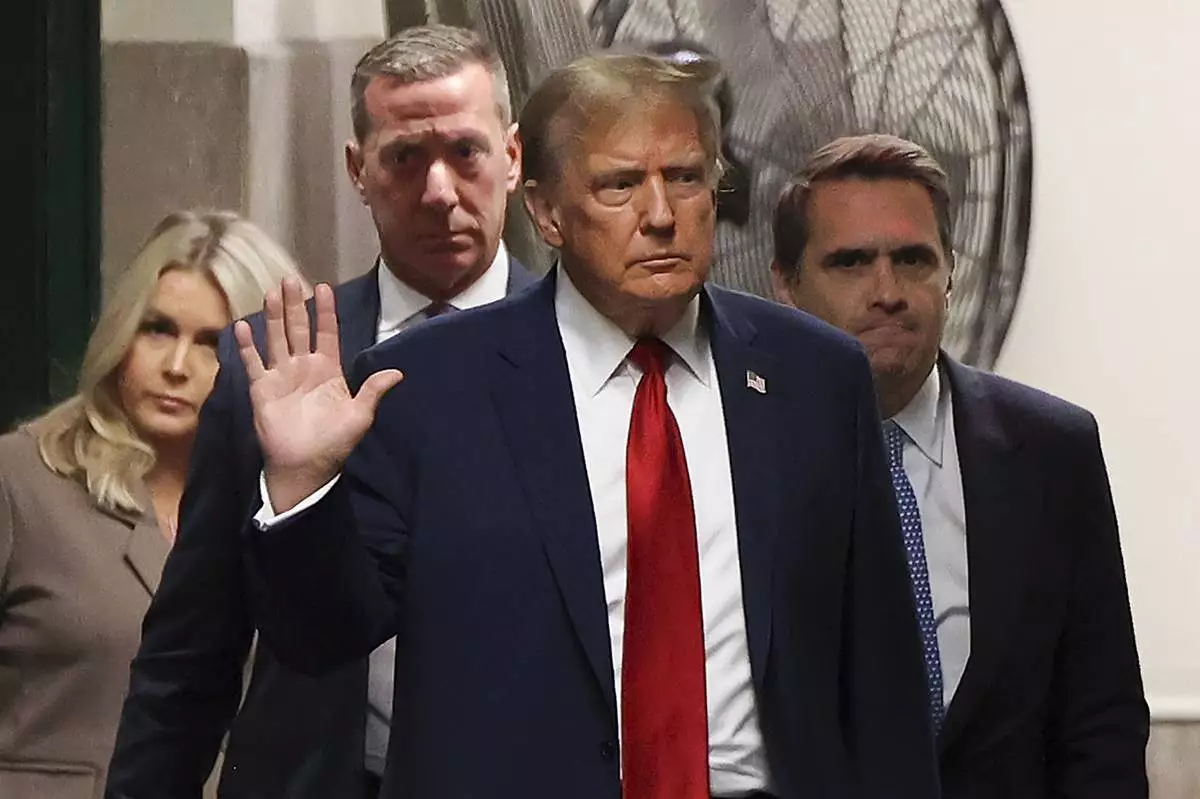
Former president Donald Trump returns to the courtroom after a recess in Manhattan criminal court, Tuesday, April 23, 2024, in New York. Trump is accused of falsifying internal business records as part of an alleged scheme to bury stories he thought might hurt his presidential campaign in 2016. (AP Photo/Yuki Iwamura, Pool)
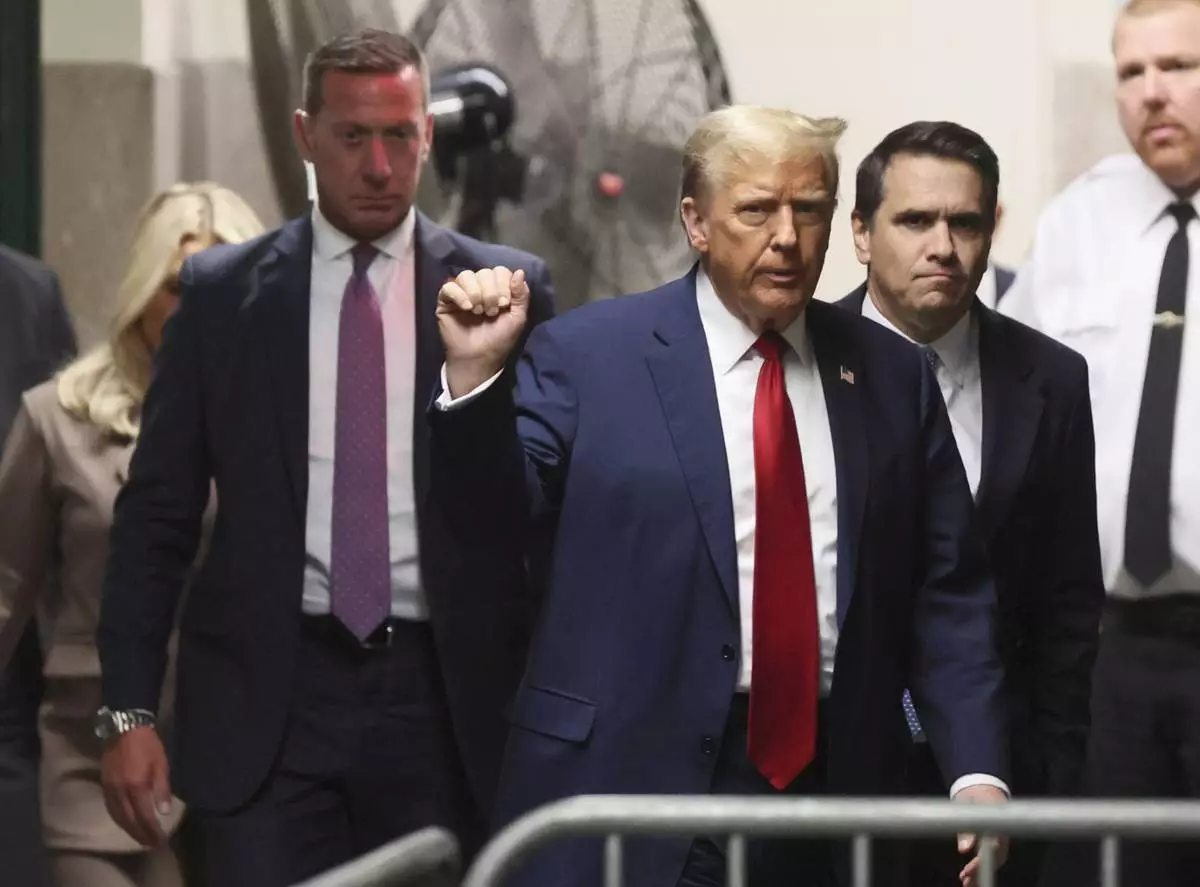
Republican presidential candidate and former U.S. President Donald Trump gestures while he walks, as his criminal trial over charges that he allegedly falsified business records to conceal money paid to silence porn star Stormy Daniels in 2016 continues, at Manhattan state court in New York, Tuesday, April 23, 2024. (Brendan McDermid/Pool Photo via AP)
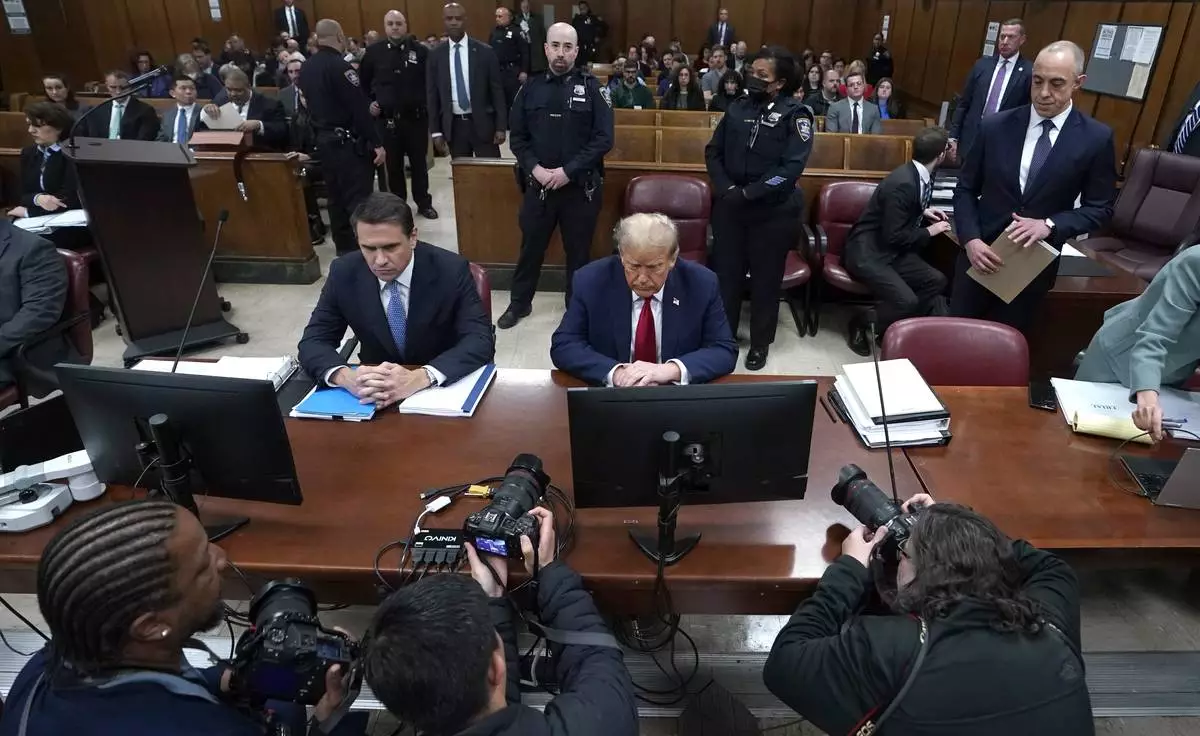
Former US President Donald Trump, with lawyer Todd Blanche, left, attends his trial for allegedly covering up hush money payments linked to extramarital affairs, at Manhattan Criminal Court in New York City, Tuesday April 23, 2024. Before testimony resumes Tuesday, the judge will hold a hearing on prosecutors' request to sanction and fine Trump over social media posts they say violate a gag order prohibiting him from attacking key witnesses. (Timothy A. Clary/Pool via AP)
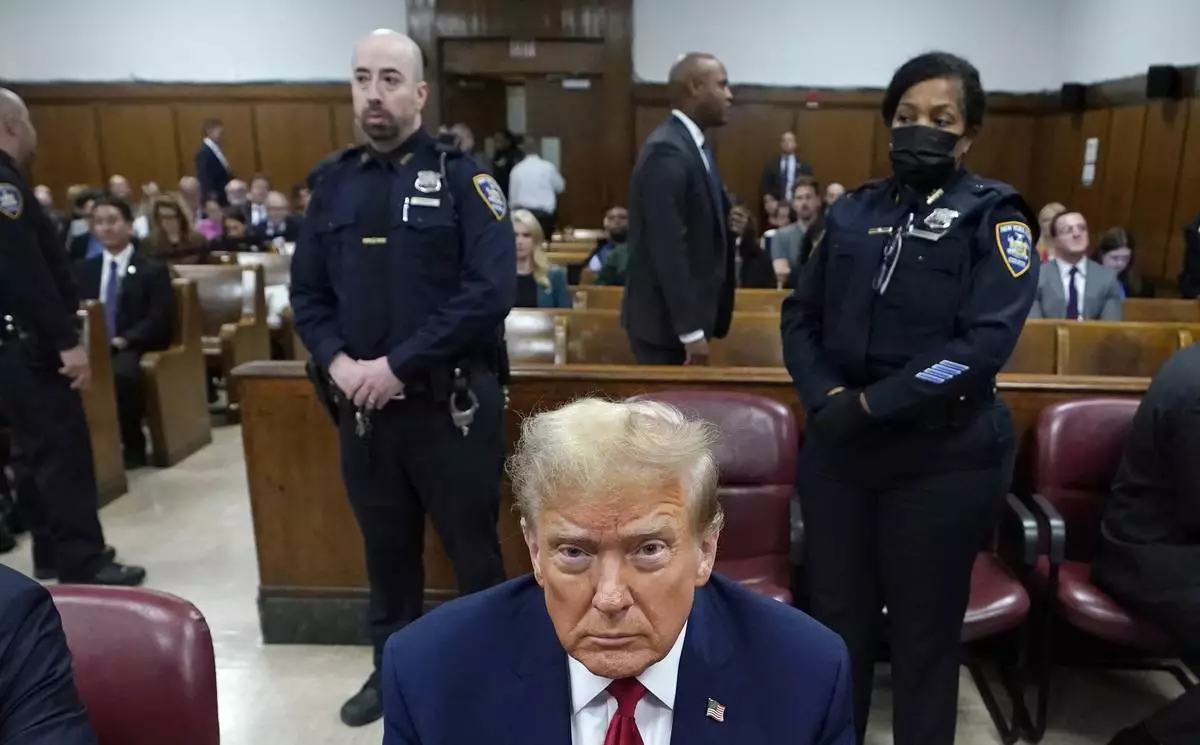
Former US President Donald Trump attends his trial for allegedly covering up hush money payments linked to extramarital affairs, at Manhattan Criminal Court in New York City, Tuesday April 23, 2024. Before testimony resumes Tuesday, the judge will hold a hearing on prosecutors' request to sanction and fine Trump over social media posts they say violate a gag order prohibiting him from attacking key witnesses. (Timothy A. Clary/Pool via AP)
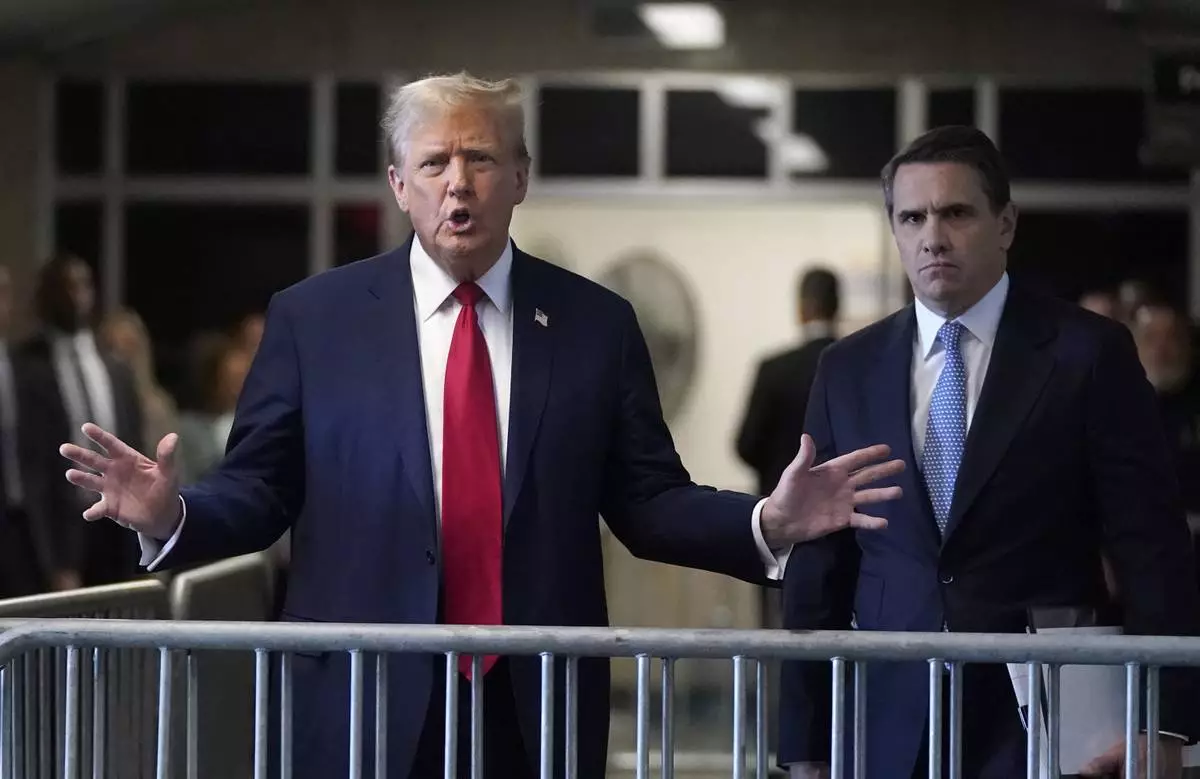
Former US President Donald Trump, left, standing next to lawyer Todd Blanche, speaks to the press as he arrives at his trial for allegedly covering up hush money payments linked to extramarital affairs, at Manhattan Criminal Court in New York City, Tuesday April 23, 2024. Before testimony resumes Tuesday, the judge will hold a hearing on prosecutors' request to sanction and fine Trump over social media posts they say violate a gag order prohibiting him from attacking key witnesses. (Timothy A. Clary/Pool via AP)
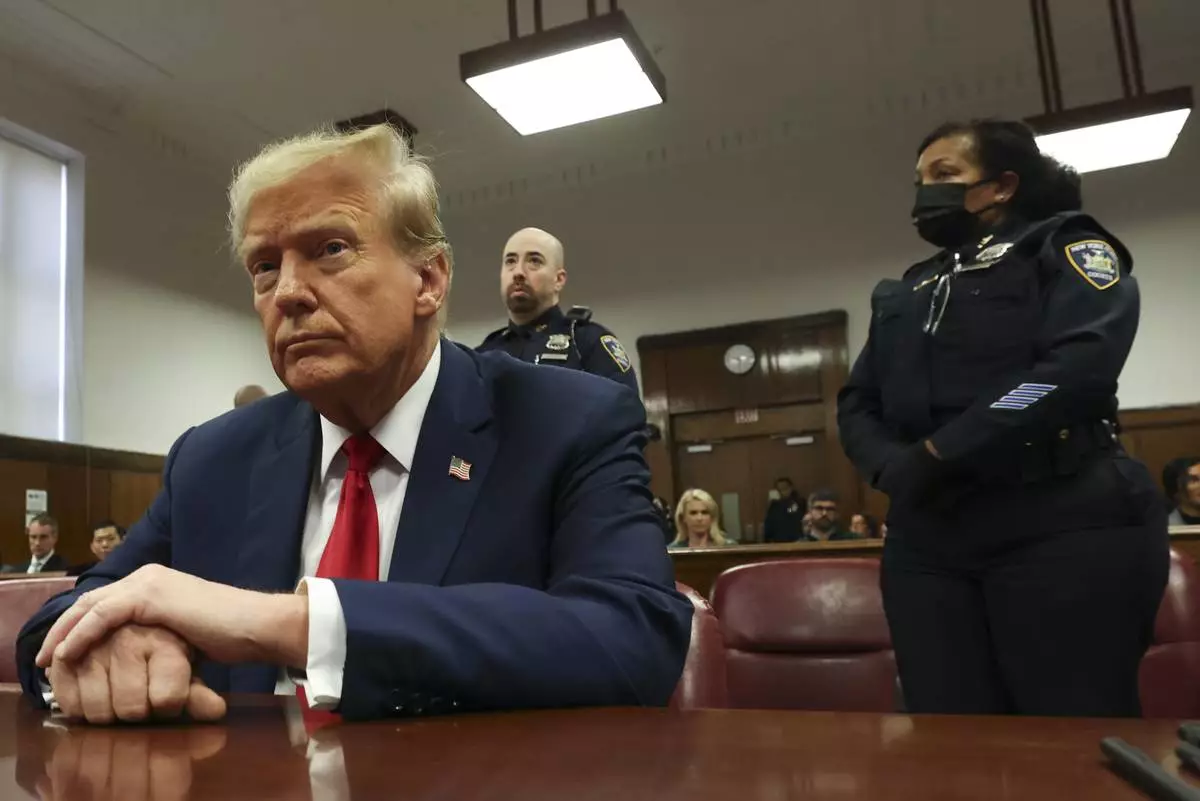
Republican presidential candidate and former President Donald Trump sits in Manhattan state court in New York, Monday, April 23, 2024. (Brendan McDermid/Pool Photo via AP)
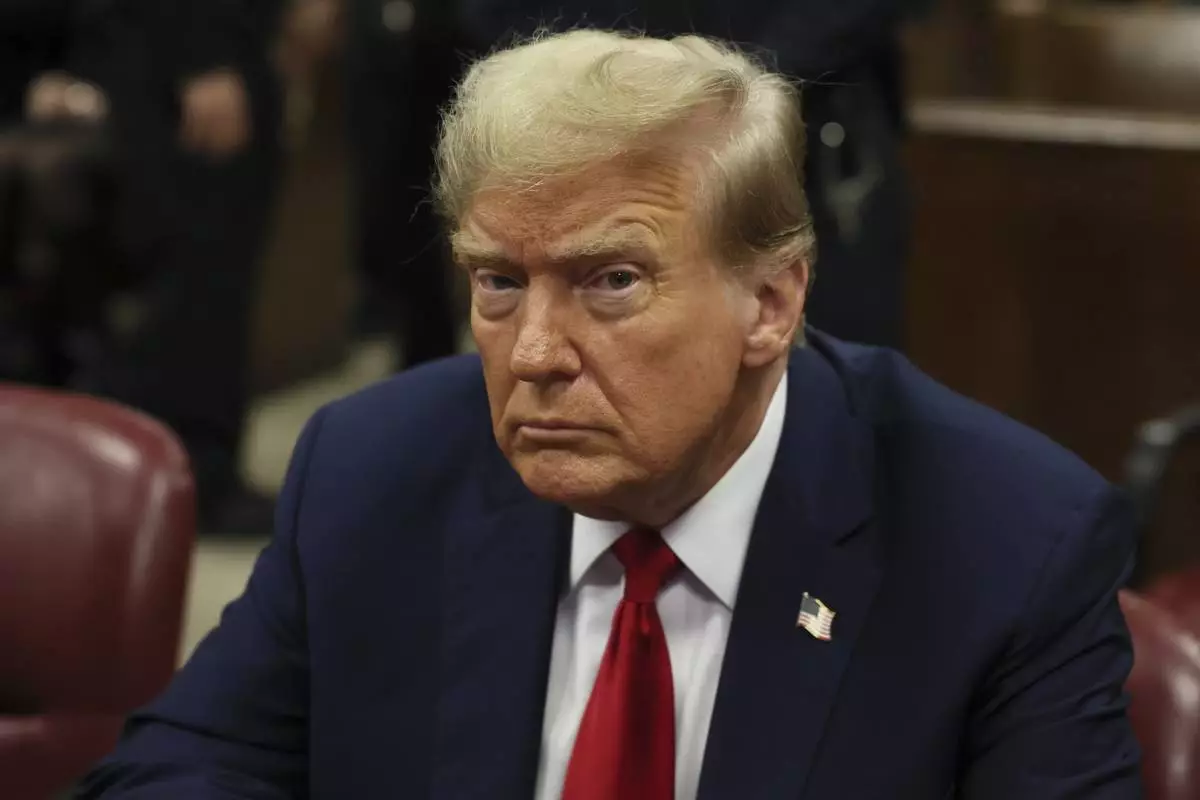
Republican presidential candidate and former President Donald Trump sits in Manhattan state court in New York, Monday, April 23, 2024. (Brendan McDermid/Pool Photo via AP)
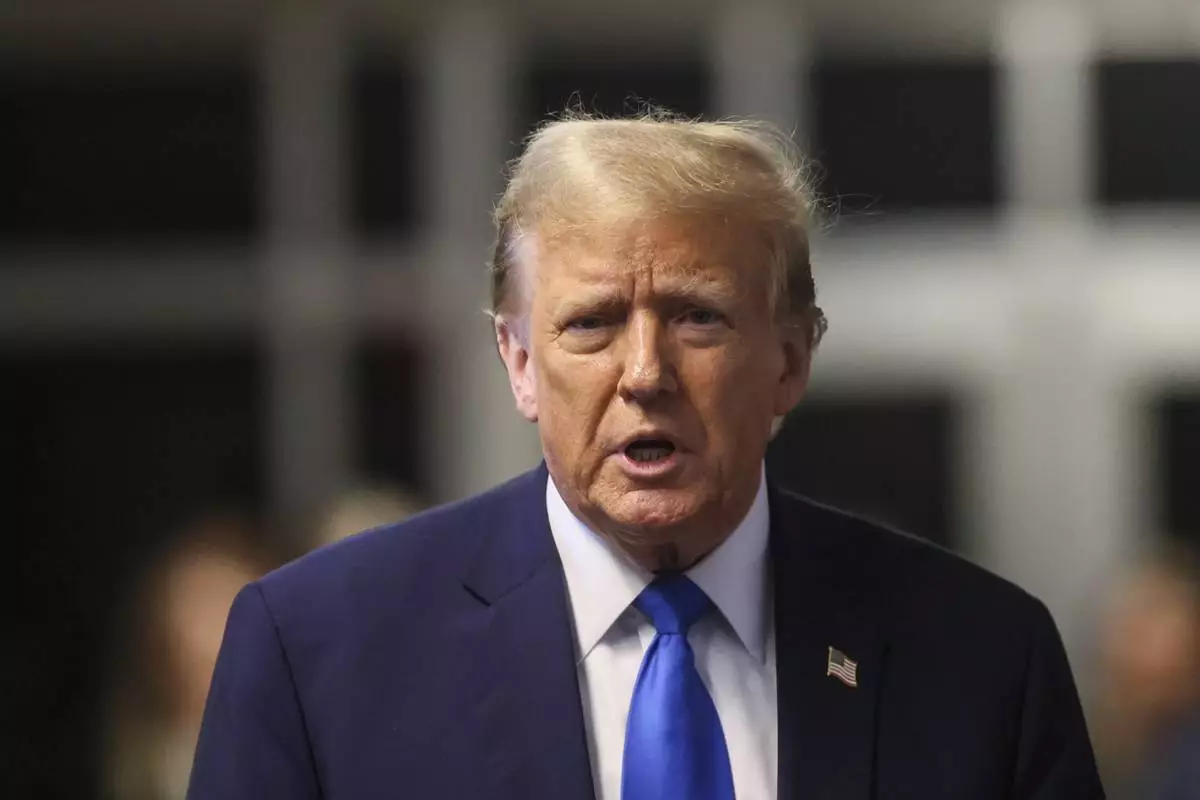
Republican presidential candidate and former President Donald Trump speaks outside the Manhattan Criminal Court in his trial for allegedly covering up hush money payments linked to extramarital affairs in New York on Monday, April 22, 2024. (Angela Weiss/Pool Photo via AP)
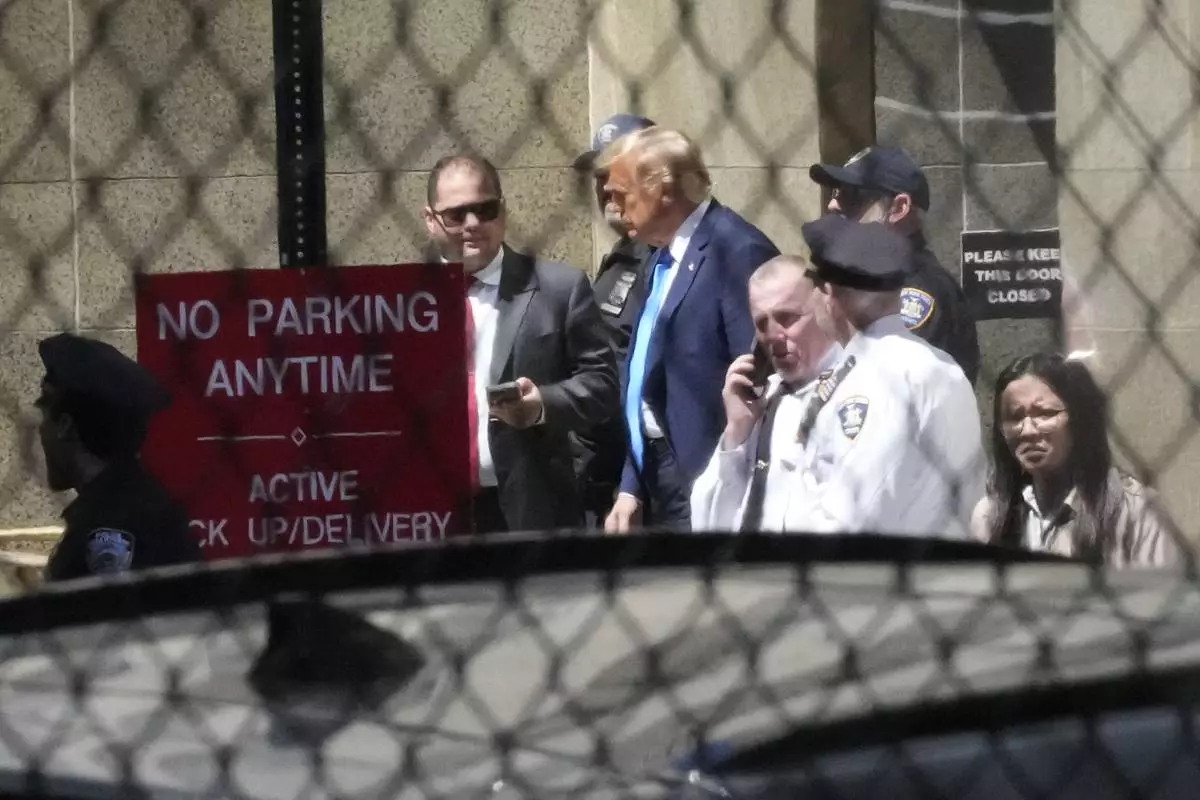
Former President Donald Trump, center, leaves Manhattan criminal court, Monday, April 22, 2024, in New York. Trump is accused of falsifying internal business records as part of an alleged scheme to bury stories he thought might hurt his presidential campaign in 2016. (AP Photo/Mary Altaffer)
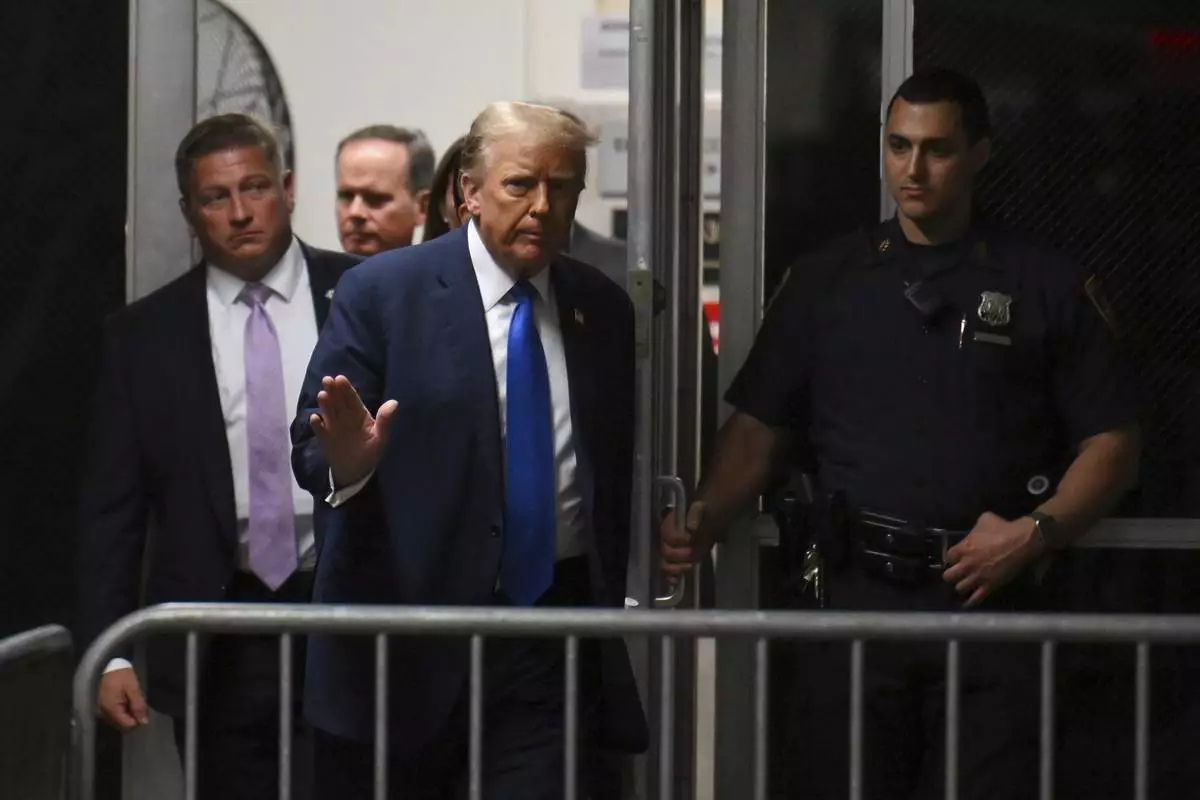
Former U.S. President and Republican presidential candidate Donald Trump returns to the courtroom after a break at Manhattan criminal court during his trial in New York, on Monday, April 22, 2024. Opening statements in Trump's historic hush money trial began Monday. Trump is accused of falsifying internal business records as part of an alleged scheme to bury stories he thought might hurt his presidential campaign in 2016. (Angela Weiss/Pool Photo via AP)
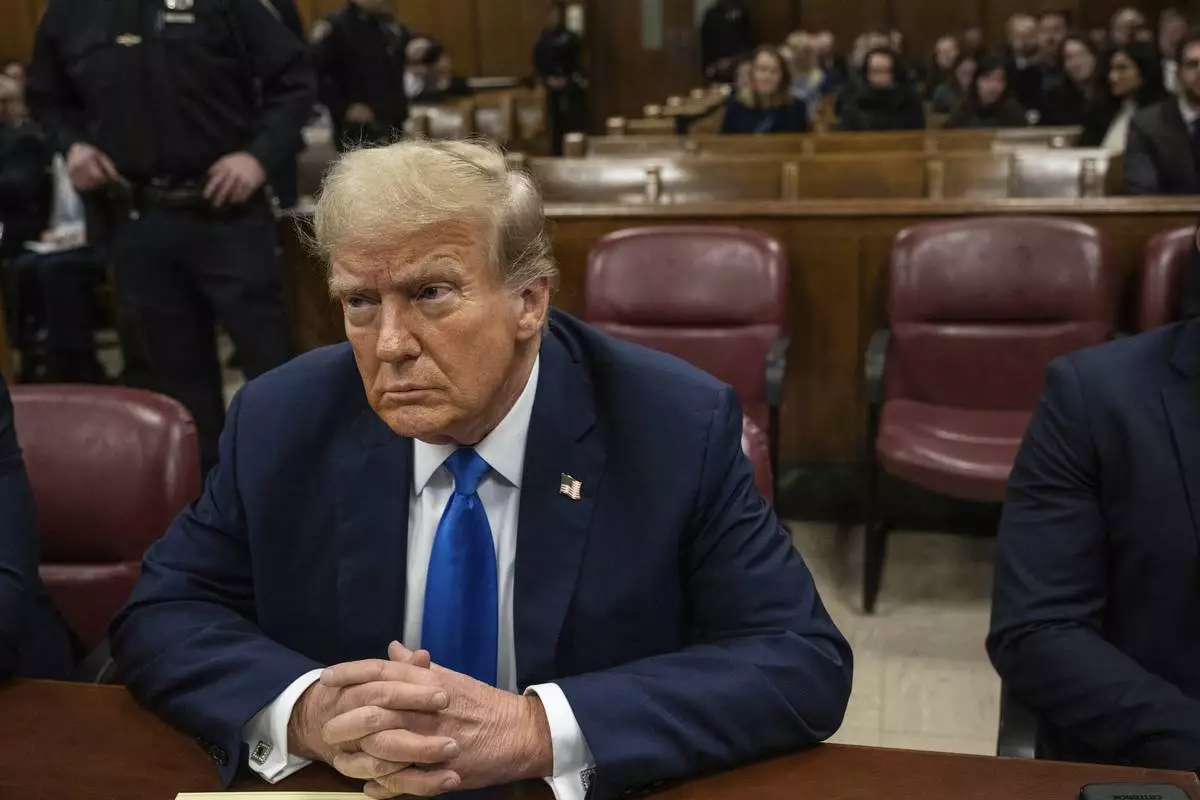
Former President Donald Trump sits in court on the first day of opening arguments in his trial at Manhattan Criminal Court in New York, Monday, April 22, 2024. (Victor J. Blue/The Washington Post via AP, Pool)


















